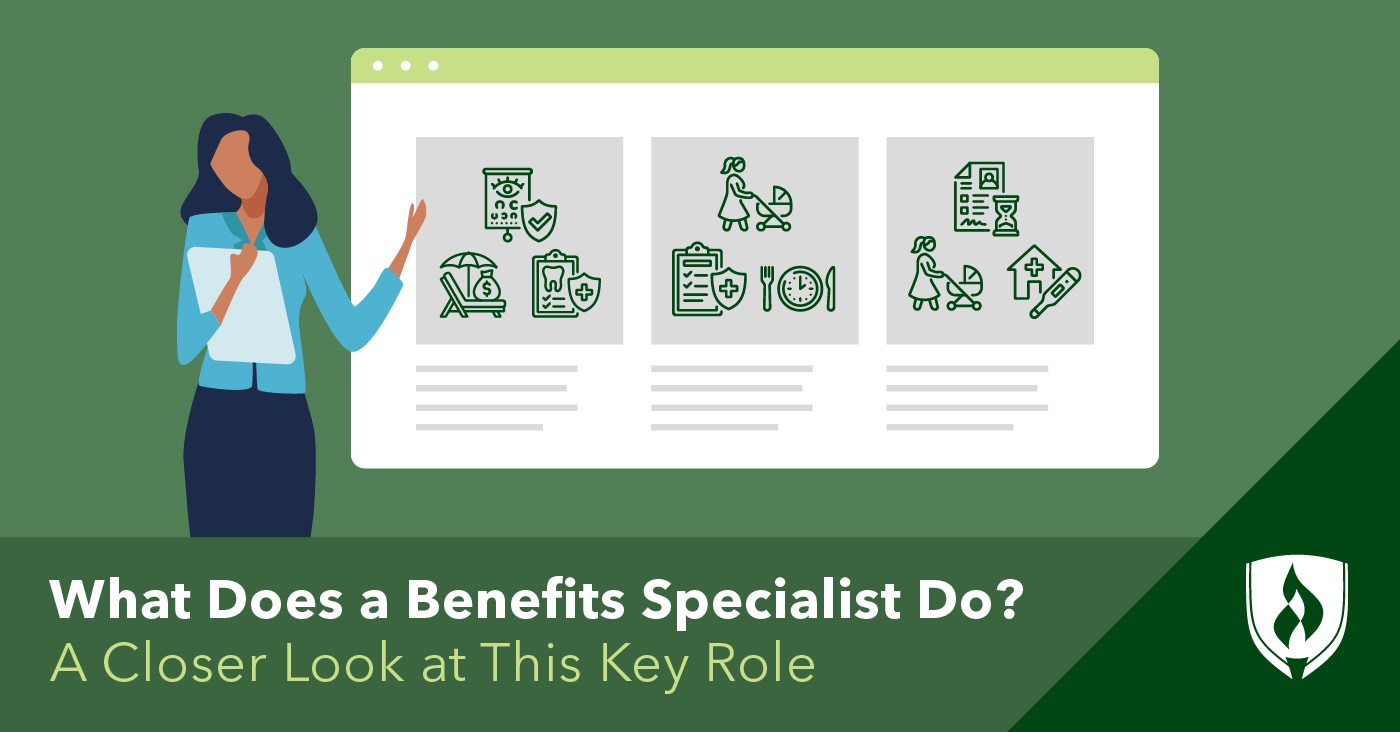What Does a Benefits Specialist Do? A Closer Look at This Key Role
By Carrie Mesrobian on 05/10/2021

If you’ve ever gone job hunting online, you’re probably used to seeing job descriptions that feature detailed lists of benefits offered somewhere after the minimum requirements section. Health insurance, paid time off, retirement plans and other programs companies offer employees are a big factor when considering a job offer.
These detailed lists offer a view into the perks and compensation packages that keep companies competitive and employees satisfied. But behind them are professionals who administer, manage and make decisions about these programs for their companies. All aspects of non-wage compensation, such as holidays and paid time off, wellness programs, life and disability insurance, retirement planning, and tuition reimbursement are complex systems that must be managed by professionals known as benefits specialists.
Does this human resources career specialty have your interest? You’re in the right place. In this article, we’ll shine a light on the role of a benefits specialist.
What is a benefits specialist?
As you probably already know, monetary compensation is not all that employees seek when looking for a job. Benefits, such as medical insurance, are a competitive aspect for companies seeking top-quality employees. Benefits specialists administer and oversee all plans and programs that their companies offer to employees. They must also keep up to date on any changes to current plans and programs to make sure their companies comply with all federal and state laws concerning non-wage compensation.
Benefits specialists maintain relationships with third-party vendors, such as insurance and financial companies, and work to communicate any changes with current policies. For many employees, the benefits specialist is the person they talk to during the open enrollment period for medical and dental insurance each year. Employees often work with benefits specialist if they’re dealing with family medical issues, such as any event covered by the Family Medical Leave Act or require any assistance in the workplace as indicated by the Americans with Disabilities Act.
“Most benefits specialists work for brokerage firms,” says Donovan Pyle, CEO of Health Compass Consulting. “There are some carriers that sell directly to employers, but they are the exception to the rule.”
What kinds of work do benefits specialists do every day?
Benefits specialists are the points of contact for their fellow employees when it comes to human resource issues, like leave-of-absence requests, insurance policy changes and any other questions regarding the company’s non-wage compensation. Some benefits specialists also handle salary, job classification and payroll, depending on the size of the company.
When a new employee is hired, it’s very likely one of the first things they do will is meet with a benefits specialist. During this on-boarding meeting, the benefits specialist will guide the new hire through paperwork and program options, answering any questions and offering advice on what options might work best.
In addition to keeping their colleagues informed about any changes or updates concerning these programs, benefits specialists also regularly communicate with third-party vendors. At times, benefits specialists are asked to weigh in on the delivery and performance of various policies the company is using.
“They may offer input to the decision-makers,” says HR consultant Michael Trust, “and anecdotal and statistical experience about how any or all of the particular benefits programs seem to be working.”
For Tomasz Mlodzki, CEO and founder of PhotoAiD, having a benefits specialist is helpful if you have at least 50 employees on staff.
“From a CEO’s perspective, the benefits specialist is an incredibly convenient and necessary person to have aboard,” Mlodzki explains. “It frees me up to focus on the bigger picture of the company.”
What types of programs do benefits specialists oversee?
Generally, benefits specialists manage and help employees navigate health insurance and retirement savings programs, like pensions and 401(k) accounts, as well as any corporate profit-sharing and stock plans. But these are not where employee benefits end.
“The employee-benefits landscape grows every year,” says Pyle, “While some companies just offer traditional portfolios of health, life, disability, dental and vision, others provide legal protection, pet insurance, voluntary benefits and a plethora of other ancillary options.”
All of these potential offerings are evaluated based on factors like their impact on profitability, employee interest and competitive positioning among other firms in the market.
What are the challenging parts of being a benefits specialist?
Depending on their experience level, some benefits specialists also advise their companies on which vendors and plans are good matches for their businesses and employees. The more advanced benefits specialist might also be involved in comparative analysis of a variety of health insurance plans and even negotiate with brokers on the best rates.
“Health insurance is the fastest-growing financial risk on many corporate profit and loss statements,” says Pyle. This adds pressure to the role of benefits specialists as they must balance employee and workforce health insurance needs and the overall cost effectiveness of an offering.
Pyle also sees growth of companies offering benefits solutions as another challenge for benefits specialists. “There’s no shortage of companies wanting to sell their solutions to employer groups,” Pyle explains. “It’s often a benefits specialist’s job to vet these solutions and protect their clients from low-performing vendors.”
What do you need to do to become a benefits specialist?
According to the Bureau of Labor Statistics, benefits specialists begin with a Bachelor’s degree.1 Communication skills and analytical thinking are also good to have.
“A successful benefits specialist is hungry,” says Mlodzki, “always on the lookout for bigger and better opportunities and ways of being cost-efficient. On top of this, they need to be very personable and approachable.”
Excellent oral and written skills are also important as benefits specialists need to tailor their message to different stakeholders. “Key audiences include employees, brokers, carriers [and] claim managers,” Trust adds. In addition to good mathematical skills and ability to read contracts and complex documents, Trust finds people skills are essential.
Trust adds the benefits specialists are often tasked to deliver bad news about benefits or claims outcomes. “So empathy, politeness and the ability to still be firm are key,” Trust advises.
Because of benefits specialists’ involvements in implementing new programs and policies, a range of skills, including sales, marketing and communications are also essential, according to Pyle. “Once a company agrees to work with a benefits firm, specialists often serve as the project manager for implementation,” Pyle explains.
Sound like the career for you?
Companies will always look to offer compensation packages and programs that balance competitive attributes with cost savings. If you like working with people, analyzing technical information and helping others negotiate complex systems, becoming a benefits specialist may be a great route to pursue on your potential human resources career path.
As you start plotting your next steps, you’ll definitely want to consider earning a degree in Human Resources. Visit the Rasmussen University Human Resources and Organizational Leadership Bachelor's degree page to learn more about the program.
1Bureau of Labor Statistics, U.S. Department of Labor, Occupational Outlook Handbook, [accessed April, 2021]




